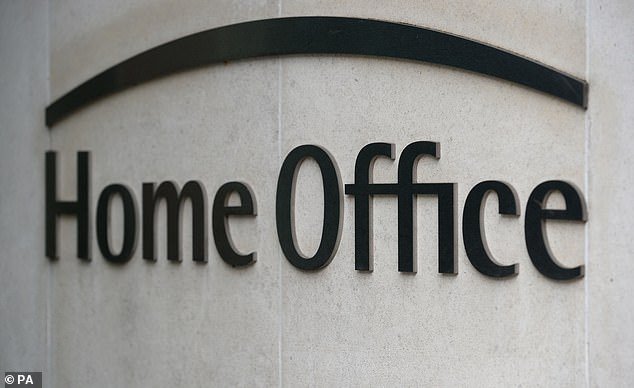Privacy rights groups have slammed the government for testing out ‘draconian’ snooping powers by teaming up with two internet providers to track websites visited by their customers.
It has been revealed that the Home Office and National Crime Agency have for months been trialling surveillance technology that could log and store the search history of every person in the UK.
The tests have been shrouded in secrecy, with the two internet service providers (ISPs) taking part remaining unnamed.
The news has sparked anger among privacy campaigners, with the Open Rights Group calling it a ‘staggering lack of transparency around mass data collection and retention’.
Others suggested the government was attempting a China-style ‘crackdown’, and that the move resembled George Orwell’s novel 1984.
Privacy rights groups have slammed the government for testing out ‘snooping powers’ by teaming up with two internet providers to track websites visited by their customers
It was made possible by the Investigatory Powers Act 2016, dubbed the ‘Snooper’s Charter’, which was spearheaded by former Home Secretary Theresa May.
The act allows the secretary of state to make an internet provider keep their records for up to a year, with a judge’s approval.
These records can include which websites their customers visit and how much data they download – but it will not show the exact content they looked at on the sites.
This could reveal a lot about a person’s habits, including where they shop, their political views and even potential what type of pornography could may watch.
First revealed in WIRED magazine, the trial’s existence was not formally announced or publicised, but was referenced in a 168-page report from the Investigatory Powers Commissioner’s Office (Ipco).
A spokesperson for the Investigatory Powers Commissioner’s Office says the trial is ongoing and that it is conducting regular reviews to ‘ensure that the data types collected remain necessary and proportionate’.
They add that once the trial has been fully assessed a decision will be made on whether the system will be expanded nationally.
But privacy campaigners have argued that lack of transparency even around the trial suggests it is not fit for its intended purpose.
Heather Burns, policy manager of Open Rights Group, said: ‘It’s needles in haystacks, and this is collecting the entire haystack.
‘We should have the right to not have every single click of what we do online hoovered up into a surveillance net on the assumption that there might be criminal activity taking place.’
Privacy International’s Advocacy Director, Edin Omanovic, said: ‘Make no mistake, as warned, the Investigatory Powers Act (2016) gives authorities across the UK some of the most far-reaching and draconian surveillance powers found anywhere in the world.
‘When the Bill was proposed, we were promised the most transparent surveillance regime in the world. Yet, here we have a secret experiment where two secret internet companies have reportedly been collecting internet browsing data about individuals’ online activities.
‘When the Home Office first made its demands public, it was obvious that what it wanted was highly vague and likely to be technically impractical. Five years later, it looks like they’re still trying to bend technical reality around their demands.
‘When the IPA was being debated, Privacy International argued that the collection and retention of internet records was not necessary or proportionate. The Home Office’s justification for these powers did not consider the full impact on individuals’ privacy.
‘The Home Office should now come clean and reveal who is involved in this experiment, what exactly they are hoping to achieve, and how many innocent internet users’ histories will be swept up by this covert, indiscriminate, mass-surveillance system.’
Reaction on social media was similarly hostile to the news, with several people saying such a move would be expected in China or Russia.
Jerry commented: ’Snooper’s charter is nothing to do with catching criminals it is all about identifying opposition to the government. They want to be just like China and crack down.’
Jake Here added: ‘Everything’s getting rather 1984 ain’t it.’
It is reported that the National Crime Agency has spent around £130,000 on external contracts to build technical systems needed to run the trials.
‘We are supporting the Home Office sponsored trial of Internet Connection Record capability to determine the technical, operational, legal and policy considerations associated with delivery of this capability,’ said a spokesperson for the National Crime Agency.
Elements of the legislation are also being challenged in court.
There has been no public announcement of the trial, with industry insiders saying they are unable to talk about the technology due to security concerns.
